|
Instrumental
Music In Worship |
||
|
History is not our final
authority in religion, but it helps us understand many issues that divide
churches today. Although the real issue of instrumental music is our view of
Biblical authority, it is good to know the history of this subject to better
understand it. The first mention of instruments being used in worship to God is in 1 Samuel 10:5. There, Samuel told Saul, "After that you shall come to the hill of God where the Philistine garrison is. And it will happen, when you have come there to the city, that you will meet a group of prophets coming down from the high place with a stringed instrument, a tambourine, a flute, and a harp before them; and they will be prophesying." We know instruments were used in the time of David (1 Chronicles 15:16, 28, 16:4-5, Psalms 150, etc.). They were also used at Solomon's Temple (2 Chronicles 5:11-14), and they were used at the rebuilt Temple after the Babylonian captivity (Ezra 3:10, Neh. 12:31-37). The only reason instrumental music was acceptable in worship during this time was because it was authorized by God. "Then he [Hezekiah] stationed the Levites in the house of the Lord with cymbals, with stringed instruments, and  with harps, according to the commandment of
David, of Gad the king's seer, and of Nathan the prophet; for thus was the
commandment of the Lord by his prophets." (2 Chronicles 29:25) with harps, according to the commandment of
David, of Gad the king's seer, and of Nathan the prophet; for thus was the
commandment of the Lord by his prophets." (2 Chronicles 29:25)"Raise a song and strike the timbrel, the pleasant harp with the lute. Blow the trumpet at the time of the New Moon, at the full moon, on our solemn feast day. For this is a statute for Israel, and a law of the God of Jacob." (Psalms 81:2-4) Yet, just because something was authorized during the Old Covenant does not mean it is authorized during the New Covenant. If we use instruments today because they were in the Old Covenant, then we also must use incense, burnt offerings, and the Levitical priesthood. Paul told the Christians of Galatia that if they observed one part of the Law, they were debtors to keep the whole Law (Galatians 5:3). In the same manner, if we go to the Old Testament for justification for instrumental music, we are debtors to also use burnt offerings and incense in our worship. God told Israel to play their instruments during the "New Moon, at the full moon, on our solemn feast day" (Psalms 81:2-4). If we used this passage to justify the use of instruments in the church, can we also use it to justify observing the New Moon? The apostle Paul instructed the Colossians to, "Let no one act as your judge in regard to food or drink or in respect to a festival or a new moon or a Sabbath day, things which are a mere shadow of what is to come; but the substance belongs to Christ" (Colossians 2:16-17). If we can see that the observance of the New Moons and other Jewish observances were shadows of the reality we have in Christ, we should be able to see that the method of worship during these observances were shadows, too. Just as we have a better Temple, High Priest, and sacrifice, we also have better music. Israel had the melody made on mechanical instruments created by man, but our melody is made in the hearts created by God. God told the Jews to use instruments. He told the Levites where to play, what to play and when to play. Nothing is said in the New Testament concerning when instruments are to be played, who is to do it or what is to be played. To do so in the church is to act without authority. This is lawlessness. Instrumental music was part of the Old Law that was taken away at the cross, along with the Levitical Priesthood, incense, burnt offerings, tithes and the Sabbath. It has nothing to do with the New Covenant instituted by Jesus Christ. The failure to see the distinction of the Old Testament from the New Testament is the source of much confusion and division today. Nothing is said about instruments at all in New Testament worship. We are given the authority to sing, but not to use instruments. Instruments are mentioned in the New Testament, but they are never connected with worship by Christians. Instrumental Music was not used in the First Century Church The writings of the early Christians make it plain that they believed instrumental music was a shadow that was done away in the passing of the Old Law. Instruments were readily available and were used by all of the pagan religions. If the Christians wanted to incorporate them into their worship, they could have done so very easily. Although the writings of the early Christians are not our final authority, they do illustrate the practice of the early church which was founded by the apostles under the guidance of the Holy Spirit.  Around 190 AD, Clement of Alexandria wrote of the need of Christians not to use
instrumental music: Around 190 AD, Clement of Alexandria wrote of the need of Christians not to use
instrumental music:"Leave the pipe to the shepherd, the flute to the men who are in fear of gods and are intent on their idol-worshipping. Such musical instruments must be excluded from our wineless feasts, for they are more suited for beasts and for the class of men that is least capable of reason than for men... In general, we must completely eliminate every such base sight or sound - in a word, everything immodest that strikes the senses (for this is an abuse of the senses) - if we would avoid pleasures that merely fascinate the eye or ear, and emasculate." Clement of Alexandria, The Instructor, The Fathers of the Church, Catholic University of America Press: Washington, 1954, pg. 130. About 200 years after Clement of Alexandria, John Chrysostom wrote that the churches had not yet introduced instruments into their services: "David formerly sang songs, also today we sing hymns. He had a lyre with lifeless strings, the church has a lyre  with living strings. Our tongues are the
strings of the lyre with a different tone indeed but much more in accordance
with piety. Here there is no need for the cithara, or for stretched strings, or
for the plectrum, or for art, or for any instrument; but, if you like, you may
yourself become a cithara, mortifying the members of the flesh and making a full
harmony of mind and body. For when the flesh no longer lusts against the Spirit,
but has submitted to its orders and has been led at length into the best and
most admirable path, then will you create a spiritual melody." John Chrysostom,
Exposition of Psalms 41, (381-398 A.D.) Source Readings in Music History, ed. O.
Strunk, W. W. Norton and Co.: New York, 1950, pg. 70. with living strings. Our tongues are the
strings of the lyre with a different tone indeed but much more in accordance
with piety. Here there is no need for the cithara, or for stretched strings, or
for the plectrum, or for art, or for any instrument; but, if you like, you may
yourself become a cithara, mortifying the members of the flesh and making a full
harmony of mind and body. For when the flesh no longer lusts against the Spirit,
but has submitted to its orders and has been led at length into the best and
most admirable path, then will you create a spiritual melody." John Chrysostom,
Exposition of Psalms 41, (381-398 A.D.) Source Readings in Music History, ed. O.
Strunk, W. W. Norton and Co.: New York, 1950, pg. 70. Eusebius of Caesarea was a church historian at the beginning of the fourth
century. In his commentary on Psalms 91:2-3, he wrote the following concerning
instrumental music: Eusebius of Caesarea was a church historian at the beginning of the fourth
century. In his commentary on Psalms 91:2-3, he wrote the following concerning
instrumental music:"Of old at the time those of the circumcision were worshipping with symbols and types it was not inappropriate to send up hymns to God with the psalterion and cithara and to do this on Sabbath days... We render our hymn with a living psalterion and a living cithara with spiritual songs. The unison voices of Christians would be more acceptable to God than any musical instrument. Accordingly in all the churches of God, united in soul and attitude, with one mind and in agreement of faith and piety we send up a unison melody in the words of the Psalms." Niceta, a bishop of Remesian (Yugoslavia) also wrote the following concerning instrumental music: "  It is time to turn to the New Testament to confirm what is
said in the Old, and, particularly, to point out that the office of psalmody is
not to be considered abolished merely because many other observances of the Old
Law have fallen into disuse. Only the corporal institutions have been rejected,
like circumcision, the Sabbath, sacrifices, discrimination of foods. So, too,
the trumpets, harps, cymbals, and timbrels. For the sound of these we now have a
better substitute in the music from the mouths of men. The daily ablutions, the
new-moon observances, the careful inspection of leprosy are completely past and
gone, along with whatever else was necessary only for a time - as it were, for
children." It is time to turn to the New Testament to confirm what is
said in the Old, and, particularly, to point out that the office of psalmody is
not to be considered abolished merely because many other observances of the Old
Law have fallen into disuse. Only the corporal institutions have been rejected,
like circumcision, the Sabbath, sacrifices, discrimination of foods. So, too,
the trumpets, harps, cymbals, and timbrels. For the sound of these we now have a
better substitute in the music from the mouths of men. The daily ablutions, the
new-moon observances, the careful inspection of leprosy are completely past and
gone, along with whatever else was necessary only for a time - as it were, for
children." 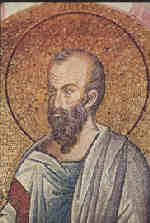 Theodoret, a bishop of Cyrhus in Syria, wrote a work called "Questions and
Answers for the Orthodox." Instrumental music was one of the many subjects
covered in this work: "107. Question: If songs were invented by unbelievers to
seduce men, but were allowed to those under the law on account of their childish
state, why do those who have received the perfect teaching of grace in their
churches still use songs, just like the children under the law? Answer: It is
not simple singing that belongs to the childish state, but singing with lifeless
instruments, with dancing, and with clappers. Hence the use of such instruments
and the others that belong to the childish state is excluded from the singing in
the churches, and simple singing is left." Theodoret, a bishop of Cyrhus in Syria, wrote a work called "Questions and
Answers for the Orthodox." Instrumental music was one of the many subjects
covered in this work: "107. Question: If songs were invented by unbelievers to
seduce men, but were allowed to those under the law on account of their childish
state, why do those who have received the perfect teaching of grace in their
churches still use songs, just like the children under the law? Answer: It is
not simple singing that belongs to the childish state, but singing with lifeless
instruments, with dancing, and with clappers. Hence the use of such instruments
and the others that belong to the childish state is excluded from the singing in
the churches, and simple singing is left."The Introduction of Instrumental Music in Churches If instrumental music was not part of early Christian worship, when did it become acceptable? Several reference works will help us see the progression of this practice among churches: "Pope Vitalian introduced an organ in the church in the seventh century to aid the singing but it was opposed and was removed." James Hasting, Encyclopedia of Religion and Ethics. "The first organ certainly known to exist and be used in a church was put in the cathedral at Aix-la-Chapel by the  German Emperor Charlemagne, who came to the
throne in 768. It met with great opposition among the Romanists, especially
among the monks, and it made its way but slowly into common use. So great was
the opposition even as late as the sixteenth century that it probably would have
been abolished by the council of Trent but for the influence of the emperor
Ferdinand... In the Greek church the organ never came into use... The Reform
church discarded it; and though the church of Basel very early introduced it, it
was in other places admitted only sparingly and after long hesitation." Schaff-Herzog
Encyclopedia, Vol. II, pg. 1702. German Emperor Charlemagne, who came to the
throne in 768. It met with great opposition among the Romanists, especially
among the monks, and it made its way but slowly into common use. So great was
the opposition even as late as the sixteenth century that it probably would have
been abolished by the council of Trent but for the influence of the emperor
Ferdinand... In the Greek church the organ never came into use... The Reform
church discarded it; and though the church of Basel very early introduced it, it
was in other places admitted only sparingly and after long hesitation." Schaff-Herzog
Encyclopedia, Vol. II, pg. 1702. The Council of Trent met in 1545. This indicates that the introduction of instrumental music was one of the latter inventions of the Roman Catholic Church. Even among the Roman Catholics, around 800 years passed before the instruments were widely accepted. "The general introduction of instrumental music can certainly not be assigned to a date earlier than the 5th or 6th centuries; yea, even Gregory the Great, who towards the end of the 6th century added greatly to the existing Church music, absolutely prohibited the use of instruments... Sir John Hawkins, following the Romanish writers in his erudite work on the history of music, made Pope Vitalian, in A.D. 660, the first who introduced organs into the churches. But students of ecclesiastical archaeology are generally agreed that instrumental music was not used in churches till a much later date; for Thomas Aquinas [Catholic Scholar in 1250 A.D.] has these remarkable words, 'Our church does not use musical instruments, as harps and psalteries, to praise God withal, that she may seem not to Judaize.'" McClintock and Strong, Encyclopedia of Biblical Literature, Vol. 6, Harper and Brothers, New York, 1894, pg. 762. "Although Josephus tells of the wonderful effects produced in the Temple by the use of instruments, the first Christians were of too spiritual a fibre to substitute lifeless instruments for or to use them to accompany the human voice. Clement of Alexandria severely condemns the use of instruments even at Christian banquets. St. Chrysostum sharply contrasts the customs of the Christians when they had full freedom with those of the Jews of the Old Testament." Catholic Encyclopedia, Vol. 10, pg. 652. "For almost a thousand years Gregorian chant, without any instrumental or harmonic addition was the only music used in connection with the liturgy. The organ, in its primitive and rude form, was the first, and for a long time the sole, instrument used to accompany the chant." Catholic Encyclopedia, Vol. 10, pg. 657.  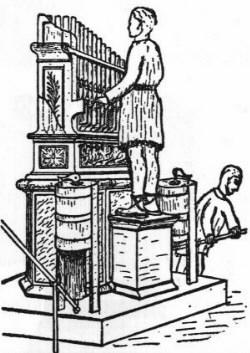 "The use of organs in churches is ascribed to Pope Vitalian (657-672).
Constantine Copronymos sent an organ with other presents to King Pepin of France
in 767. Charlemagne received one as a present from the Caliph Haroun al Rashid,
and had it put up in the cathedral of Aixia-Chapelle... The attitude of the
churches toward the organ varies. It shared, to some extent, the fate of images,
except that it never was an object of worship... The Greek church disapproved
the use of organs. The Latin church introduced it pretty generally, but not
without the protest of eminent men, so that even in the Council of Trent a
motion was made, though not carried, to prohibit the organ at least in the
mass." Philip Schaff, History of the Christian Church, Vol. 4, pg. 439. "The use of organs in churches is ascribed to Pope Vitalian (657-672).
Constantine Copronymos sent an organ with other presents to King Pepin of France
in 767. Charlemagne received one as a present from the Caliph Haroun al Rashid,
and had it put up in the cathedral of Aixia-Chapelle... The attitude of the
churches toward the organ varies. It shared, to some extent, the fate of images,
except that it never was an object of worship... The Greek church disapproved
the use of organs. The Latin church introduced it pretty generally, but not
without the protest of eminent men, so that even in the Council of Trent a
motion was made, though not carried, to prohibit the organ at least in the
mass." Philip Schaff, History of the Christian Church, Vol. 4, pg. 439.Instruments were not used extensively until the 13th and 14th centuries. In many cases they were used only as a prelude to the singing but not with the singing itself. Notice what the Catholics themselves write concerning their introduction of instrumental music: "We need not shrink from admitting that candles, like incense and lustral water, were commonly employed in pagan worship and the rites paid to the dead. But the Church, from a very early period, took them into her service, just as she adopted many other things indifferent in themselves, which seemed proper to enhance the splendor of religious ceremony. We must not forget that most of these adjuncts to worship, like music, lights, perfumes, ablutions, floral decorations, canopies, fans, screens, bells, vestments, etc. were not identified with any idolatrous cult in particular but they were common to almost all cults." Catholic Encyclopedia, Vol. III, pg. 246. Instrumental Music In The Protestant Reformation The Reformation in the 16th century raised a great debate over authority. Does it come from the church, tradition along with God or God alone? The Reformers said authority comes from God through the Bible alone. In June or July of 1524, images, relics and organs were removed from the Reformed churches. All of the Protestant churches that grew out of the Reformation rejected instrumental music as being "Popish" or "Romish" and unscriptural. The Church of England was the only Protestant church that continued using it in the beginning. When their leaders met to make a decision on this issue, 59 voted to use instruments and 58 voted against their use. Notice what some of the leaders of this movement said concerning instrumental music:  "Musical instruments in celebrating the praises of God would be no more suitable
than the burning of incense, the lighting of lamps and the restoration of other
shadows of the Law. The Papists therefore have foolishly borrowed this as well
as many other things from the Jews. Men who are fond of outright pomp may
delight in the noise, but the simplicity which God commands to us by the
apostles is far more pleasing to Him." John Calvin, Commentary on Psalms 23. "Musical instruments in celebrating the praises of God would be no more suitable
than the burning of incense, the lighting of lamps and the restoration of other
shadows of the Law. The Papists therefore have foolishly borrowed this as well
as many other things from the Jews. Men who are fond of outright pomp may
delight in the noise, but the simplicity which God commands to us by the
apostles is far more pleasing to Him." John Calvin, Commentary on Psalms 23."The organ in the worship is an insignia of Baal." Martin Luther, founder of the Lutheran Church. "Music in churches is as ancient as the apostles, but instrumental music is not so." Joseph Bingham, Church of England. "I have no objection to the organs in our chapels, as long as they are neither seen nor heard." John Wesley, founder of the Methodist Church. "The great congregation which is blessed with the privilege of listening to His instruction has no organ 'to assist' them in singing their praises to their God and Savior. They find their vocal organs sufficient. Their tongues and voices express the gratitude of their hearts... I would just as soon pray to God with machinery as to sing to God with machinery." Charles Spurgeon (Baptist), Instrumental Music In the Public Worship of the Church, p. 176. 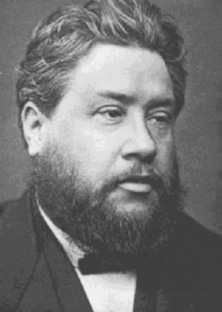 "David appears to have had a peculiarly tender remembrance of the singing of the
pilgrims, and assuredly it is the most delightful part of worship and that which
comes nearest to the adoration of heaven. What a degradation to supplant the
intelligent song of the whole congregation by the theatrical prettiness of a
quartet, bellows, and pipes. We might as well pray by machinery as praise by
it... 'Praise the Lord with harp.' Israel was at school, and used childish
things to help her to learn; but in these days when Jesus gives us spiritual
food, one can make melody without strings and pipes... We do not need them. That
would hinder rather than help our praise. Sing unto him. This is the sweetest
and best music. No instrument is like the human voice." Charles Spurgeon
(Baptist), Commentary on Psalm 42. "David appears to have had a peculiarly tender remembrance of the singing of the
pilgrims, and assuredly it is the most delightful part of worship and that which
comes nearest to the adoration of heaven. What a degradation to supplant the
intelligent song of the whole congregation by the theatrical prettiness of a
quartet, bellows, and pipes. We might as well pray by machinery as praise by
it... 'Praise the Lord with harp.' Israel was at school, and used childish
things to help her to learn; but in these days when Jesus gives us spiritual
food, one can make melody without strings and pipes... We do not need them. That
would hinder rather than help our praise. Sing unto him. This is the sweetest
and best music. No instrument is like the human voice." Charles Spurgeon
(Baptist), Commentary on Psalm 42."In my earliest intercourse among this people, congregational singing generally prevailed among them... This instrument, [the organ] which from time immemorial has been associated with cathedral pomp and prelatical power, and has always been the peculiar favorite of great national churches, at length found its way into Baptist sanctuaries, and the first one ever employed by the denomination in this country, and probably in any other, might have been standing in the singing gallery of the Old Baptist meeting house in Pawtucket, about forty years ago, when I then officiated as pastor (1840)... Staunch old Baptists in former times would as soon tolerated the Pope of Rome in their pulpits as an organ in their galleries, and yet the instrument has gradually found its way among them... How far this modern organ fever will extend among our peoples and whether it will on the whole work a RE-formation or DE-formation in their singing service, time will more fully develop." Benedict, (Baptist Historian), Fifty Years Among Baptists, pp. 204-207. "But were it even evident, which it is not, either from this or any other place in the sacred writings, that instruments  of music were prescribed by divine
authority under the law, could this be adduced with any semblance of reason,
that they ought to be used in Christian worship? No; the whole spirit, soul, and
genius of the Christian religion are against this; and those who know the Church
of God best, and what constitutes its genuine spiritual state, know that these
things have been introduced as a substitute for the life and power of religion;
and that where they prevail most, there is least of the power of Christianity.
Away with such portentous baubles from the worship of that infinite Spirit who
requires His followers to worship Him in spirit and truth, for to no such
worship are these instruments friendly." Adam Clarke (Methodist), Clarke's
Commentary, Vol. II, pp. 690-691. of music were prescribed by divine
authority under the law, could this be adduced with any semblance of reason,
that they ought to be used in Christian worship? No; the whole spirit, soul, and
genius of the Christian religion are against this; and those who know the Church
of God best, and what constitutes its genuine spiritual state, know that these
things have been introduced as a substitute for the life and power of religion;
and that where they prevail most, there is least of the power of Christianity.
Away with such portentous baubles from the worship of that infinite Spirit who
requires His followers to worship Him in spirit and truth, for to no such
worship are these instruments friendly." Adam Clarke (Methodist), Clarke's
Commentary, Vol. II, pp. 690-691."I am an old man, and an old minister; and I here declare that I never knew them productive of any good in the worship of God; and have had reason to believe that they were productive of much evil. Music, AS A SCIENCE, I esteem and admire: but instruments of music in the house of God, I abominate and abhor. This is the abuse of music; and here I register my protest against all such corruptions in the worship of the Author of Christianity. The late and venerable and most eminent divine, the Rev. John Wesley, who was a lover of music, and an elegant poet, when asked his opinion of instruments of music being introduced into the chapels of the Methodists, said in his terse and powerful manner, 'I have no objections to instruments of music in our chapels, provided they are neither heard nor seen.' I say the same." Adam Clarke (Methodist), Clarke's Commentary, Vol. 4, p. 684. "Question 6. Is there any authority for instrumental music in the worship of God under the present dispensation? Answer. Not the least, only the singing of psalms and hymns and spiritual songs was appointed by the apostles; not a syllable is said in the New Testament in favor of instrumental music nor was it ever introduced into the Church until after the eighth century, after the Catholics had corrupted the simplicity of the gospel by their carnal inventions. It was not allowed in the Synagogues, the parish churches of the Jews, but was confined to the Temple service and was abolished with the rites of that dispensation." Questions on the Confession of Faith and Form of Government of The Presbyterian Church in the United States of America, published by the Presbyterian Board of Publications, Philadelphia, Pennsylvania, 1842, pg. 55. Instrumental music was not generally introduced in the Protestant churches until the 1800's. It was not introduced in the Presbyterian church until 1864. In 1860, the Free Methodists banned it. When it was introduced in denominations, it consistently caused division and conflict because it was not part of New Testament worship. Instrumental Music in the Restoration Movement After the beginning of the Protestant Reformation, many kept studying and looking for what was authorized by Scripture. The result led to what some call the "Restoration Movement." Those in this movement shared the goal of rejecting all man-made doctrines and simply being Christians. Alexander and Thomas Campbell and Barton W. Stone, who had a Presbyterian background, were influential leaders in this movement. They accepted the same view toward Biblical authority as Zwingli and Calvin. Their goal was to follow God's commands completely without adding to or taking away from the Scriptures in any area. The result of this view towards Biblical authority caused them to reject the use of instruments in worship. Four Principles accepted within the Restoration Movement 1. The acknowledgment of the New Testament Scriptures as the only authority for rule and faith and practice among Christians. 2. Renunciation of all human creeds and acceptance of the commands and examples of Jesus as the only creed binding upon Christians. 3. The restoration of the apostolic or New Testament concept of the church in the minds of men. We must conform our worship and our lives after the divine pattern that is revealed in the Bible. 4. The union of all Christians on the basis of only the Bible. The attitude of the men involved in the Restoration Movement towards instrumental music can be seen in their writings: 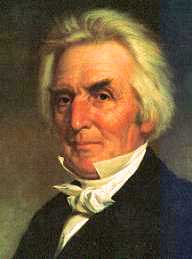 "Instrumental music in worship] was well adapted to churches founded on the
Jewish pattern of things and practicing infant sprinkling. That all persons
singing who have no spiritual discernment, taste or relish for spiritual
meditation, consolations and sympathies of renewed hearts should call for such
an aid is but natural. So to those who have no real devotion and spirituality in
them, and whose animal nature flags under the opposition or the oppression of
church service I think that instrumental music would... be an essential
prerequisite to fire up their souls to even animal devotion. But I presume, that
to all spiritually-minded Christians, such aid would be as a cow bell in a
concert." Alexander Campbell, recorded in Robert Richardson's biography,
Memoirs of Alexander Campbell, Vol. 2. "Instrumental music in worship] was well adapted to churches founded on the
Jewish pattern of things and practicing infant sprinkling. That all persons
singing who have no spiritual discernment, taste or relish for spiritual
meditation, consolations and sympathies of renewed hearts should call for such
an aid is but natural. So to those who have no real devotion and spirituality in
them, and whose animal nature flags under the opposition or the oppression of
church service I think that instrumental music would... be an essential
prerequisite to fire up their souls to even animal devotion. But I presume, that
to all spiritually-minded Christians, such aid would be as a cow bell in a
concert." Alexander Campbell, recorded in Robert Richardson's biography,
Memoirs of Alexander Campbell, Vol. 2."Instrumental music is permissible for a church under the following conditions: When a church never had or has lost the Spirit of Christ. If a church has a preacher who never had or has lost the Spirit of Christ, who has become a dry, prosing and lifeless preacher. If a church only intends being a fashionable society, a mere place of amusements and secular entertainment and abandoning the idea of religion and worship. If a church has within it a large number of dishonest and corrupt men. If a church has given up all idea of trying to convert the world." Ben Franklin, editor of American Christian Review, 1860. "We cannot, therefore, by any possibility, know that a certain element of worship is acceptable to God in the Christian dispensation, when the Scriptures  which speak of that dispensation are silent in reference to it. To introduce any
such element is unscriptural and presumptuous. It is will worship, if any such
thing as will worship can exist. On this ground we condemn the burning of
incense, the lighting of candles, the wearing of priestly robes, and the reading
of printed prayers. On the same ground we condemn instrumental music." J.W.
McGarvey, The Millennial Harbinger, 1864, pp. 511-513.
which speak of that dispensation are silent in reference to it. To introduce any
such element is unscriptural and presumptuous. It is will worship, if any such
thing as will worship can exist. On this ground we condemn the burning of
incense, the lighting of candles, the wearing of priestly robes, and the reading
of printed prayers. On the same ground we condemn instrumental music." J.W.
McGarvey, The Millennial Harbinger, 1864, pp. 511-513.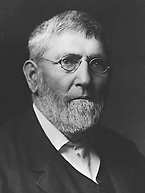 "Neither he [Paul] nor any other apostle, nor the Lord Jesus, nor any of the
disciples for five hundred years, used instruments. This too, in the face of the
fact that the Jews had used instruments in the days of their prosperity and that
the Greeks and heathen nations all used them in their worship. They were dropped
out with such emphasis that they were not taken up till the middle of the Dark
Ages, and came in as part of the order of the Roman Catholic Church. It seems
there cannot be doubt but that the use of instrumental music in connection with
the worship of God, whether used as a part of the worship or as an attraction
accompaniment, is unauthorized by God and violates the oft-repeated prohibition
to add nothing to, take nothing from, the commandments of the Lord. It destroys
the difference between the clean and the unclean, the holy and unholy, counts
the blood of the Son of God unclean, and tramples under foot the authority of
the Son of God. They have not been authorized by God or sanctified with the
blood of his Son." David Lipscomb, editor of the Gospel Advocate. "Neither he [Paul] nor any other apostle, nor the Lord Jesus, nor any of the
disciples for five hundred years, used instruments. This too, in the face of the
fact that the Jews had used instruments in the days of their prosperity and that
the Greeks and heathen nations all used them in their worship. They were dropped
out with such emphasis that they were not taken up till the middle of the Dark
Ages, and came in as part of the order of the Roman Catholic Church. It seems
there cannot be doubt but that the use of instrumental music in connection with
the worship of God, whether used as a part of the worship or as an attraction
accompaniment, is unauthorized by God and violates the oft-repeated prohibition
to add nothing to, take nothing from, the commandments of the Lord. It destroys
the difference between the clean and the unclean, the holy and unholy, counts
the blood of the Son of God unclean, and tramples under foot the authority of
the Son of God. They have not been authorized by God or sanctified with the
blood of his Son." David Lipscomb, editor of the Gospel Advocate.For 50 years the Restoration movement remained united. Beginning with two congregations of less than 100, in 50 years, it grew to over 400,000. It grew to become the fourth largest religious group in the United States. The unity was shattered between 1860 - 1900 by two issues, missionary societies and instrumental music. The heart of both issues concerned differences in views toward authority. With both issues, some were saying, "The Bible doesn't say you can't!" while others were trying to be faithful to what the Bible taught concerning these matters. The first time instrumental music was used among the Restoration movement was in 1860. The church in Midway, KY began using a melodian in its worship. Their preacher, L. L. Pinkerton, said that the singing was so bad that it would scare the rats out of the church building and the melodian was needed to help their singing. This was the same time period instruments were beginning to be introduced among the Presbyterians, Baptists, Methodists and other denominations (the same was happening with the missionary societies). Christians failed to learn from the example given of the Jews when they wanted to be like others about them. "Look, you are old, and your sons do not walk in your ways. Now make for us a king to judge us like all the nations." (1 Sam. 8:5) The men of Israel began to look at the other nations for guidance concerning their nation, rather than the Word of God. Rather than seeking the will of God, they began to seek their own will. The next few verses reveal what the true problem was. They were not submissive to their God. "But the thing displeased Samuel when they said, 'Give us a king to judge us.' So Samuel prayed to the Lord. And the Lord said to Samuel, 'Heed the voice of the people in all that they say to you; for they have not rejected you, but they have rejected Me, that I should not reign over them'." (1 Samuel 8:6-7) In the same manner, God's people wanted to be like the other religious groups about them. Instead of examining the revealed will of God in the Scriptures, they turned to the denominations for guidance in what they desired. At first, there was controversy among the churches, and then division. Those opposed to the instruments believed it was not authorized. Others were going to have it anyway. Many had to leave congregations they helped to build for conscience' sake.  J. W. Harding, father of James Harding who Harding School is named after, was a
preacher and elder at the Court Street Church of Christ in Winchester, KY for
twenty years. He helped establish this congregation in 1887. He and fifteen
others were driven off by those wanting to bring in the organ. A delegation was
sent to Harding with the following ultimatum: J. W. Harding, father of James Harding who Harding School is named after, was a
preacher and elder at the Court Street Church of Christ in Winchester, KY for
twenty years. He helped establish this congregation in 1887. He and fifteen
others were driven off by those wanting to bring in the organ. A delegation was
sent to Harding with the following ultimatum:"We love you, Brother Harding, and you know that we do. But if it must come to a choice between you and the organ, we will have the organ." This expresses the attitude even today. When it comes to a choice between what God authorizes in the Scriptures and the organ, many are saying, "We will have the organ." A story told by Mrs. Louise Canby Hockaday, who was a young woman when instruments caused division at the 17th and Olive Church, also reveals the attitudes among some who claimed to be disciples of Jesus: "By a majority of more than two to one, the church that met in the chapel of Thorpe Spring Christian College found its members bitterly opposed to the adoption of the organ in the fall of 1895. When members came to services on a Saturday night to hear W. M. Davis, minister of the First Christian Church in Dallas who was to begin an evangelistic effort, they found the instrument inside waiting to be used. When services were ready to begin, a Miss Bertha Mason took her seat to play. A. J. Clark... led a fervent prayer. He followed this by reading a document which he had prepared. The lights proved too dim for his old eyes, so he asked Pleas Taylor to complete the reading. It was a petition signed by 230 members of the congregation, asking the instrument not be used. After the reading, Addison merely looked to the organist and said, 'Play on, Miss Bertha.' The majority of the congregation walked out. Only a few attended the succeeding days of the meeting which closed in failure." This was a display of the attitude of Uzziah in 2 Chronicles 26. "We don't care if it is not authorized. We don't care what division it may cause, we are going to have it anyway! 'Play on, Miss Bertha!'" After the fighting had climaxed, approximately five sixths of the congregations accepted instruments in worship while one sixth remained non-instrumental. Who was responsible for this division? Those who introduced the instrument or those who opposed it? Suppose one wanted to introduce a lamb to the Lord's supper and we opposed it and it divided the church. Who would be responsible? Those who introduced it or those who opposed it? Once the authority of the Scriptures was rejected, there was no limit to the changes men would bring into their religion. Many of those who rejected the authority of God with the instrumental music, are now as far gone as some of the most liberal denominations. Their rejection of the authority of God's Word concerning instrumental music led to involvement in church sponsored entertainment and social activities, to even a rejection of the inspiration of the Scriptures. Those who later rejected the authority of the Scriptures with the issue over human institutions decades later are following the same path. The Shifting Defenses of Instrumental Music Those who accept instrumental music have tried to defend their practice from Scripture. It is interesting to see how the tactics have changed in debates through the years. In 1920, O. E. Payne claimed that instrumental music is required by the Greek word "psallo". In 1923, Ira Boswell claimed that instrumental music is permitted by the Greek word "psallo." In the 1950's, Julian Hunt claimed that instrumental music was only an aid to worship, rather than an addition. This was an admission that nothing is said about it in the New Testament. He claimed he was not really adding to the Word. In 1985, Don DeWelt claimed that congregational singing is not authorized by the Scriptures. Therefore, if churches can have unauthorized congregational singing, other churches can have unauthorized instrumental music. This was an admission of the lack of authority for instruments. However, just because one group may be involved in an authorized practice, doesn't permit someone else to do wrong. In 1987, Given O. Blakely claimed that no authority is needed for worship. He is no longer pretending to follow the authority of God. This is a total rejection of the idea of following a pattern. Some call this a "New Hermeneutics". Men may rationalize all they want. They can talk about what they feel, think or desire. It still comes down to our view towards the authority of God's Word. Are we going to strive to do our best not to add to or take away from God's Word, or are we free to change it as we see fit? Conclusion The context of Colossians 3:16 is the unity that Christians must have. "And so, as those who have been chosen of God, holy and beloved, put on a heart of compassion, kindness, humility, gentleness and patience; bearing with one another, and forgiving each other, whoever has a complaint against anyone; just as the Lord forgave you, so also should you. And beyond all these things put on love, which is the perfect bond of unity. And let the peace of Christ rule in your hearts, to which indeed you were called in one body; and be thankful. Let the word of Christ dwell in you richly in all wisdom, teaching and admonishing one another in psalms and hymns and spiritual songs, singing with grace in your hearts to the Lord." (Colossians 3:12-15) Those who brought in instruments have divided the church instead of uniting it. They have divided the church by their insistence of adding to the Word of God. The only way instruments can be justified in worship to God is by including them by the authority of man. "Whoever transgresses and does not abide in the doctrine of Christ does not have God. He who abides in the doctrine of Christ has both the Father and the Son. If anyone comes to you and does not bring this doctrine, do not receive him into your house nor greet him; for he who greets him shares in his evil deeds." (2 John 9-11) Music in the New Testament "And after singing a hymn, they went out to the Mount of Olives." (Matthew 26:30) "But about midnight Paul and Silas were praying and singing hymns of praise to God, and the prisoners were listening to them." (Acts 16:25) "and for the Gentiles to glorify God for His mercy; as it is written, 'Therefore I will give praise to Thee among the Gentiles, And I will sing to Thy name.'" (Romans 15:9) "What is the outcome then? I shall pray with the spirit and I shall pray with the mind also; I shall sing with the spirit and I shall sing with the mind also." (1 Corinthians 14:15) "Speaking to one another in psalms and hymns and spiritual songs, singing and making melody with your heart to the Lord." (Ephesians 5:19) "Let the word of Christ richly dwell within you, with all wisdom teaching and admonishing one another with psalms and hymns and spiritual songs, singing with thankfulness in your hearts to God." (Colossians 3:16) "...I will proclaim Thy name to My brethren, In the midst of the congregation I will sing Thy praise." (Hebrews 2:12) "Through Him then, let us continually offer up a sacrifice of praise to God, that is, the fruit of lips that give thanks to His name." (Hebrews 13:15) "Is anyone among you suffering? Let him pray. Is anyone cheerful? Let him sing praises." (James 5:13) Summary of The Passages - We are told to sing. - We are told what to sing: psalms, hymns and spiritual songs. - We are told how to sing: with the understanding, with the spirit, in our heart and with grace. - We are told why to sing: teach, admonish, give thanks, praise God and express cheer. - We are not told where to sing. We are not limited in location, but are to sing anywhere. - Instrumental music is not mentioned. |
||
|
Instrumental Music In Worship - Part 1 Home |
||